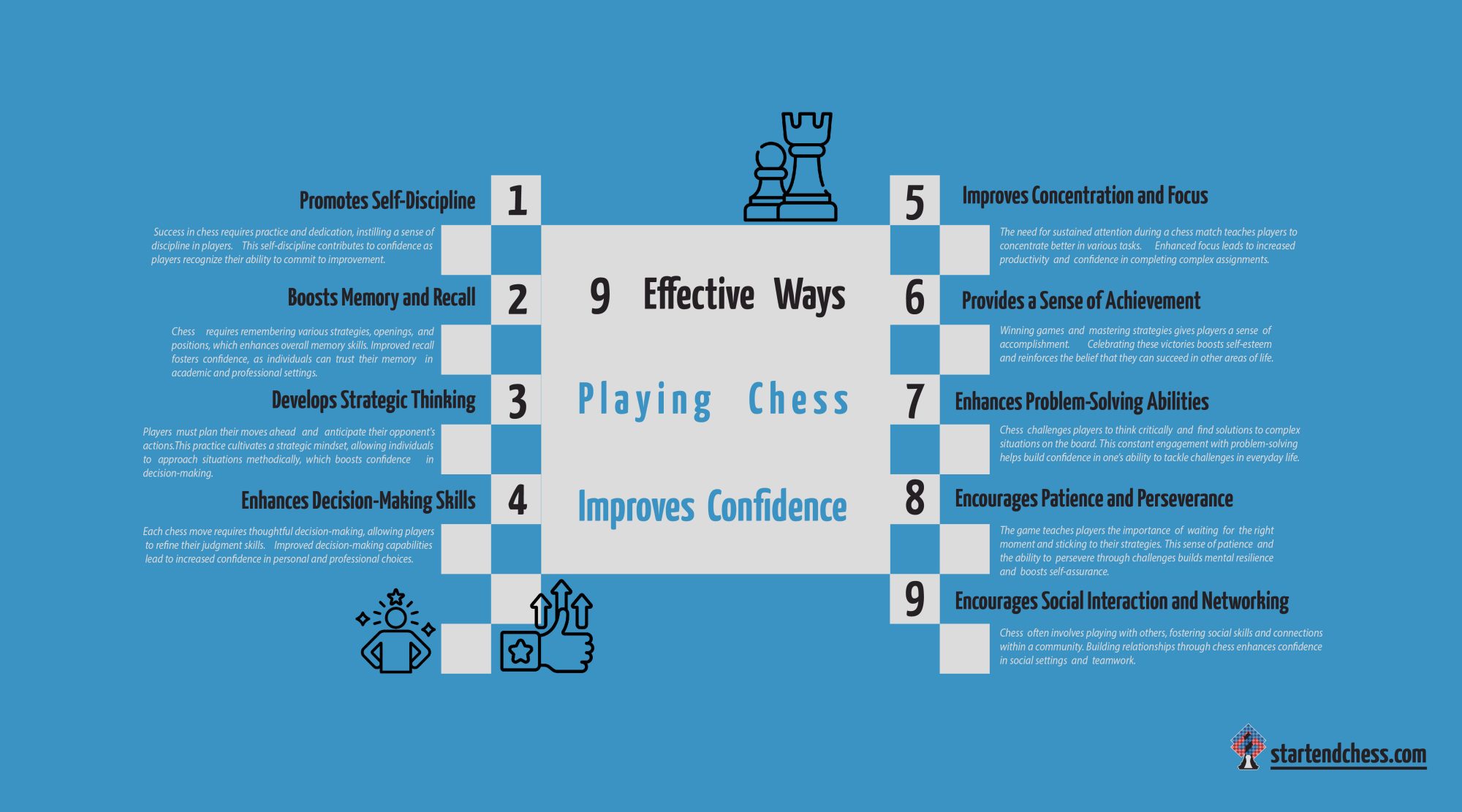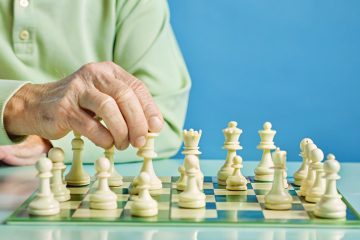9 Effective Ways Playing Chess Improves Confidence
Playing chess is more than just a mental exercise—it’s a powerful tool for personal growth. One of the most profound impacts of chess is how it significantly improves confidence. From the novice learning their first moves to the seasoned player mastering complex strategies, playing chess improves confidence by fostering critical thinking, decision-making, and problem-solving skills. As each game unfolds, players learn to trust their instincts, refine their focus, and embrace challenges head-on, boosting self-esteem both on and off the board.
For those looking to enhance their mental resilience and gain a stronger sense of self, playing chess improves confidence in multiple ways. Whether it’s learning to think several moves ahead or adapting to an opponent’s strategy, chess offers valuable lessons in persistence, discipline, and patience. As you see progress in your skills, you build self-assurance, knowing that with effort and practice, personal growth is inevitable. Let’s explore the key ways chess contributes to building lasting confidence.

-
Enhances Problem-Solving Abilities
Breaking Down Complex Problems: Chess is a game of strategy and foresight. Every move has to be well thought out in anticipation. And with this kind of mental gymnastics daily, you develop problem-solving ability. As you learn how to move around complex positions, you will be able to anticipate the opposite player’s moves; you will become more capable of breaking down intricate problems into manageable parts.
Building Confidence Through Mastery: The perfect ending of these skills on the chessboard is conversion into more confidence in solving problems outside the board. It boosts your ego, knowing that you can solve intricate problems, and it prepares you for real-life situations where critical thinking will be needed.
-
Develops Strategic Thinking
Planning Ahead: Chess teaches you to always think a few moves in advance. This strategic planning is important not only in the successful playing of games but also in attaining success with goals set in life. The more one learns to foresee the results and make plans, the more self-assured they become with the decisions they make in life.
Applying Strategies to Life: Strategies learnt in the game of chess can be effectively utilized in one’s personal and professional life. When one starts feeling constructive outcomes of one’s decisions due to strategy, one gains more confidence through an enhanced feeling of belief in one’s capability.
-
Improves Concentration and Focus
Sustained Attention: A game of chess needs full attention. One moment of distraction may lead to defeat. Through chess, one practices sustained attention; later on, it improves the condition of concentrating on the tasks one is engaged in.
Confidence in Staying Composed: Better concentration results in improved performance of tasks that you are focusing on; in return, it builds up your confidence to be competent and composed at the right moments.
-
Boosts Memory and Recall
Remembering Moves and Patterns: Playing chess requires one to memorize different openings and defenses, along with tactical patterns. This constant use of memory fortifies your ability for quick and accurate memorization.
Trusting Your Memory: With an improved memory through chess, you are confident that you can remember significant details that may be required for you at work during a presentation or remembering certain information during exams.
-
Encourages Patience and Perseverance
Waiting for the Right Moment: Chess teaches the value of patience. Because of impatience, one can make a wrong move; on the other hand, waiting for an appropriate chance can make the game turn in the right direction.
Building Resilience: Patience and persisting through difficult games help to breed mental toughness. All this resilience does a lot in boosting one’s confidence, knowing that he can survive through difficulties and come out well.

-
Enhances Decision-Making Skills
Making Informed Choices: Every move in chess should be based on a reasoned decision, realized considering the analysis and strategy. This will help you decide on critical situations much quicker.
Confidence in Your Judgments: Better decision-making enhances your confidence in the judgments you make. You learn to believe in yourself and you feel less indecisive or doubtful on many life issues.
-
Promotes Self-Discipline
Commitment to Improvement: The improvement in chess requires practice and study. Such commitment builds self-discipline, which is an asset in each and every area of life.
Achieving Goals: With every progress seen as a result of disciplined effort, your confidence grows. You feel that with dedication, there is achievement, and hence you believe in yourself to reach your goals.
-
Provides a Sense of Achievement
Winning Games and Overcoming Challenges: There is a unique good feeling about winning in chess or about the right move being well-planned. Success, whether large or small, adds on to building positive self-images.
Celebrating Progress: Your recognition of your improvement and success in chess builds up a person’s self-esteem. Indeed, after achieving success, one feels more confident with other activities.
-
Encourages Social Interaction and Networking
Connecting with Others: Chess clubs and tournaments provide that opportunity to meet people with similar interests. Engaging with a community helps develop better social skills, thereby instilling confidence to deal with others.
Learning from Peers: Playing against other opponents exposes one to different styles of plays and strategies. It is in learning and adapting that confidence in your capability for growth and improvement through collaboration is boosted.

Conclusion
Playing chess is a transformative experience that not only sharpens the mind but also boosts self-confidence in profound ways. The mental challenges and triumphs experienced during each game reinforce resilience, patience, and the ability to make sound decisions under pressure. Whether you’re honing problem-solving skills, improving memory, or developing strategic thinking, every chess match builds a stronger, more self-assured version of yourself. Playing chess improves confidence by turning each move into a learning experience, teaching you to trust your judgment and empowering you to tackle challenges in everyday life.
Incorporating chess into your routine is more than just a hobby—it’s an investment in personal development. The growth you experience as a chess player, from mastering complex tactics to celebrating hard-earned victories, directly translates to an enhanced sense of self-worth. By embracing the lessons chess offers, you’ll gain confidence not only in your playing abilities but in every decision you make, both on and off the board.
We’ve prepared a podcast to accompany this article, offering the same insights in an audio format. If you enjoy listening, give it a play!
Recommended Articles:
- 9 Valuable Life Lessons Children Learn Through Playing Chess
- 7 Incredible Benefits of Playing Chess for Mental Mastery
- Chess Mindfulness: How Playing Chess Can Improve Your Mental Well-Being
- The Psychological Benefits of Chess: Stress Relief and Focus



0 Comments